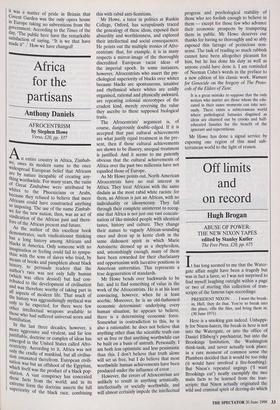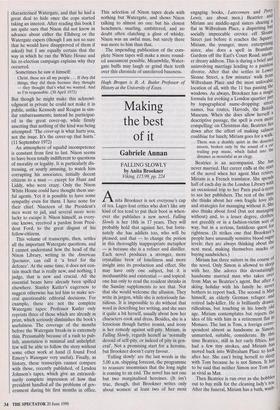Off limits and on record
Hugh Brogan
ABUSE OF POWER: THE NEW NIXON TAPES edited by Stanley Kutler The Free Press, £20, pp. 675 It has long seemed to me that the Water- gate affair might have been a tragedy but was in fact a farce, so I was not surprised to find myself laughing outright within a page or two of starting this collection of tran- scripts of the famous tape-recordings: PRESIDENT NIXON: .. . I want the break- in. Hell, they do that. You're to break into the place, rifle the files, and bring them in. (30 June 1971) Here is a smoking gun indeed. Unhappi- ly for Nixon-haters, the break-in here is not into the Watergate, or into the office of Daniel Ellsberg's psychiatrist, but into the Brookings Institution, the Washington think-tank, and never actually took place: in a rare moment of common sense the Plumbers decided that it would be too risky (it would have involved a fire-bombing). But Nixon's repeated urgings CI want Brookings cut') neatly exemplify the two main facts to be learned from the tran- scripts: that Nixon actually originated the wild and criminal spirit of derring-do which characterised Watergate, and that he had a great deal to hide once the cops started taking an interest. After reading this book I am quite sure that Nixon did not know in advance about either the Ellsberg or the Watergate capers (though I am not so sure that he would have disapproved of them if asked) but I am equally certain that the way in which he ran the White House and his re-election campaign explains why they occurred.
Sometimes he saw it himself: Christ, these are all my people . . If they did things, they did them because they thought — they thought that's what we wanted. And so I'm responsible. (30 April 1973) But though he might make this acknowl- edgment in private he could not make it in public, unlike Kennedy and Reagan in sim- ilar embarrassments; instead he participat- ed in the great cover-up, while firmly asserting that nothing of the kind was being attempted: 'The cover-up is what hurts you, not the issue. It's the cover-up that hurts.' (11 September 1972) An atmosphere of squalid incompetence is constant from first to last. Nixon seems to have been totally indifferent to questions of morality or legality. It is particularly dis- tressing, or sourly amusing, to watch him corrupting his associates, initially decent citizens to a man — except for Hunt and Liddy, who were crazy. Only the Nixon White House could have thought them use- ful agents. Yet it is possible to have some sympathy even for them. I have none for their chief. Nineteen of the President's men went to jail, and several more were lucky to escape it. Nixon himself, as every- one knows, received a pardon from Presi- dent Ford, to the great disgust of his fellow-citizens.
This volume of transcripts, then, settles all the important Watergate questions, and I cannot understand how the head of the Nixon Library, writing in the American Spectator, can call it 'a brief for the defence'. At the same time, it does not con- tain much that is really new, and nothing, I judge, that is new and crucial. All the essential beans have already been spilled elsewhere. Stanley Kutler's eagerness to suggest otherwise has led him to make sev- eral questionable editorial decisions. For example, these are not the complete Watergate tapes: Professor Kutler only reprints three of those which are already in print, which seriously diminishes the book's usefulness. The coverage of the months before the Watergate break-in is extremely thin. Presumably because of a rush to pub- lish, annotation is minimal and unhelpful: few will be able to follow the story without some other work at hand (I found Fred Emery's Watergate very useful). Finally, as history, these transcripts cannot compare with those, recently published, of Lyndon Johnson's tapes, which give an extraordi- narily complete impression of how that president handled all the problems of gov- ernment during his first months in office. This selection of Nixon tapes deals with nothing but Watergate, and shows Nixon talking to almost no one but his closest henchmen, snarling, embittered, and no doubt often clutching a glass of whisky. Nixon was an awful man, but surely there was more to him than that.
The impending publication of the com- plete Nixon tapes will make a more round- ed assessment possible. Meanwhile, Water- gate buffs may laugh or grind their teeth over this chronicle of unrelieved baseness.
Hugh Brogan is R. A. Butler Professor of History at the University of Essex.



























































 Previous page
Previous page